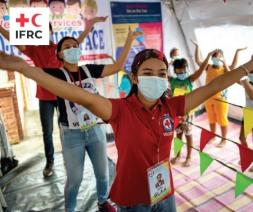The pathway and the trainings are aligned with and based on the core and technical competency framework for PGI.
The different modules correlate with the different “tiers” related to what role you have. The first tiers in the CORE Competency Framework, the “foundational”, and “tier 1”; are the ones that represent the competencies required by all staff and volunteers.
In addition to the below, there are many online and face to face trainings that are more thematically focused such as for Safeguarding, Trafficking in Persons, SGBV and Child Protection - click here for more information.
Introduction to PGI (90 minutes online course) – The aim of the online course is to provide a comprehensive introduction to PGI: concepts, definitions and contexts. It will build an understanding of the core approaches of the IFRC to PGI while contextualizing all Staff and Volunteer responsibilities to PGI and how it is relevant to the learner’s role/work and to understand what they can do to prevent exclusion/provide space for inclusion. The course will also raise awareness of the available tools and mechanisms guiding PGI work. PGI Foundations online course is a pre-requisite for other PGI trainings. (PGI core competencies foundational tier)
PGI Core Training (3-day face-to-face or remote) – The aim of the PGI Core training is to raise awareness, build skills and change behaviour in relation to PGI. The training takes into account the many different types of audience that would benefit from building confidence and skills in PGI to be able to apply it to their daily work. The overall objective of the training is to enable participants to understand the key elements of PGI, and their implications for their respective areas of work. This is achieved through learning about key principles and analysing and integrating considerations of dignity, access, participation and safety into programmes and institutional processes. (PGI core competencies foundational and tier 1)
Materials for delivery face to face
PGI Core Training of Trainer Module (3-day face-to-face and remote) – The training of trainer (ToT) module aims to provide participants with a solid understanding of PGI with additional knowledge and skills to be able to facilitate a basic PGI training programme independently or with minimal support. The target participants are people who already have some experience in PGI and have received basic training. It prepares the PGI focal points, staff and delegates to roll-out a basic PGI training programme for IFRC and National Society staff and volunteers and builds their confidence in talking about PGI and addressing challenging topics. (PGI Core competencies tier 1 and 2, + PGI technical competencies tier 1)
Materials for delivery face to face
PGI Core Training for Operational Leadership (remote) - This content and methodology is developed to target IFRC operational leadership (HEoPs, team leaders, operational managers and programme coordinators) in building their core competencies on PGI with focus on operational design, team-management and decision-making. (PGI core competencies tiers 2&3)
Available on demand: click here
PGI specialized training for rapid response personnel (5-day face-to-face) - The IFRC emergency PGI pool consists of a register of highly skilled PGI professionals ready to be deployed at short notice to any disasters or crises. These PGI specialists come from within the Red Cross and Red Crescent network and are on existing IFRC Secretariat and National Societies' emergency rosters. A key element in developing and maintaining the PGI register/rosters is a standardised PGI specialized training and assessment that all members need to complete. The aim of this training is to ensure that all PGI professionals share a common understanding of what is expected when working in an emergency operation for the Red Cross and Red Crescent. (PGI technical competencies tiers 1&2)
Available on demand: click here




